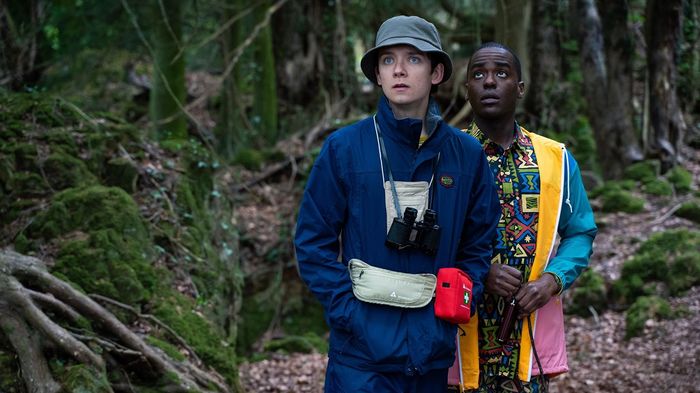Hugh Grant: the hero of the awkward, romantic teenager
Hugh Grant might have played one kind of character seventeen times, but Alfie Barrishi loves him nevertheless
It was 2017, I was sat in English class, and it was Christmas time. Our teacher wanted us to get into the festive spirit, so he put on Love Actually – the film that prompted everyone everywhere to ask: is it okay for a Prime Minister to date his secretary?
While the film’s answer is a problematic ‘sometimes’, I was charmed by Hugh Grant’s inoffensive stammering and hapless dance moves, and so later that day, I decided to watch Four Weddings and a Funeral. Bumbling, stammering, permanently-quiffed – that same character appeared again, only this time without the power of Parliament behind him, and once again, he got the girl.
To my lovelorn teenage mind, this was a beacon of hope. Sure, I had more spots than him, and my hair only had 20% of the flop-factor, but here was a skinny, unassuming romantic winning the affections of some of the most beautiful women on the planet. If he could do it, why couldn’t I?
Thus was born a generation of emotionally expressive teenagers with floppy long hair and a penchant for grand romantic gestures. It’s something we’ve seen countless times on the big screen, from Augustus Waters in The Fault in Our Stars to James McAvoy in Starter For Ten. The type of man who is unafraid to express how he feels, no matter how foolish he might make himself look in the process.
It’s a far cry from the toxic masculinity of the popular imagination – the image of sullen, emotionally repressed men spewing misogyny in football changing rooms. In comparison, Hugh Grant’s hopeless romanticism seems innocuous.
Watching it in the #MeToo era feels like watching an advert warning about inappropriate workplace relationships
But is there something more sinister at work? The romantic-comedy genre has always faced accusations that it perpetuates unrealistic romantic expectations, and despite its light-hearted sentiment, watching Love Actually in the #MeToo era feels uncomfortably like watching an advert warning about inappropriate workplace relationships. From today’s perspective, Hugh Grant’s Prime Minister exploits the position of power over his subordinates in an unacceptable way and, we shouldn’t give him the benefit of the doubt just because he’s attractive.
Plus, isn’t the whole boy-meets-girl, boy-chases-girl, boy-messes-up-but-eventually-wins-girl story a little played out at this point? The reason that Bridget Jones’ Diary was so refreshing was that it told the story from a woman’s perspective - a woman who isn’t a one-dimensional, flawless accessory to the male protagonist, but who is conflicted, complicated and ambitious.
The romantic comedy has come a long way since the 1990s. Love, Simon challenged the heteronormativity of the genre, and Don Jon presented us with a man wrestling with a porn addiction. 2017’s The Big Sick captured the complicated experience of navigating multi-racial relationships in the modern world, where – despite the largely positive societal consensus – many communities are still uncomfortable with the idea of them. In this context, focusing our attentions on the romantic exploits of straight, white men seems outdated. There’s no shortage of representation for the demographic, and in often presenting their female counterparts with only modest amounts of agency, such films run the risk of reinforcing a patriarchal framework for romantic relationships.
But having said that, I’ll still often find myself trawling through Youtube at 2am on a Tuesday morning, watching clips of Colin Firth yelling stilted Portuguese to a girl on a restaurant balcony, asking her to marry him. So is there still a place for the Hugh Grant archetype in modern cinema?
Emotional openness is refreshing in an era defined by bullish masculinity in politics
In the cultural consciousness, his performances have become a synecdoche for the deluge of bumbling rom-com protagonists that came after him. His characters in Notting Hill, Four Weddings and a Funeral and About a Boy are sensitive, kind and loyal to their friends, and this emotional openness is refreshing in an era defined by bullish masculinity in politics. For all the rightful talk about how we need more diversity on screen, the sensitive masculinity of his performances remains relevant in today’s cinematic landscape.
What is outdated about his early films is their focus on a white, British, middle-class man. The essential elements of his trademark performance – self-deprecation, awkward mannerisms and wit – are not. Perhaps the most relevant way to honour his legacy is to use his portrayals of sensitive masculinity and awkward charm as foundations for new characters, characters with more diverse backgrounds and perspectives than those of the rom-coms of the 1990s.
So as you curl up in front of the TV with a bowl of popcorn in search of escapist entertainment, take a moment to reflect on Hugh Grant – the man who defined an era of the romantic comedy.
 Features / Should I stay or should I go? Cambridge students and alumni reflect on how their memories stay with them15 December 2025
Features / Should I stay or should I go? Cambridge students and alumni reflect on how their memories stay with them15 December 2025 News / Cambridge study finds students learn better with notes than AI13 December 2025
News / Cambridge study finds students learn better with notes than AI13 December 2025 News / Uni Scout and Guide Club affirms trans inclusion 12 December 2025
News / Uni Scout and Guide Club affirms trans inclusion 12 December 2025 Comment / The magic of an eight-week term15 December 2025
Comment / The magic of an eight-week term15 December 2025 News / News In Brief: Michaelmas marriages, monogamous mammals, and messaging manipulation15 December 2025
News / News In Brief: Michaelmas marriages, monogamous mammals, and messaging manipulation15 December 2025










